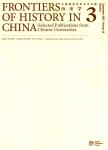Rethinking the History and Theory of Jus Publicum Universal: The Formation of China as a "Semi-Civilized" Legal Subject
Rethinking the History and Theory of Jus Publicum Universal: The Formation of China as a "Semi-Civilized" Legal Subject作者机构:Department of History The University of Chicago Chicago IL 60637 USA
出 版 物:《Frontiers of History in China》 (中国历史学前沿(英文版))
年 卷 期:2017年第12卷第2期
页 面:181-261页
学科分类:0303[法学-社会学] 0301[法学-法学] 03[法学] 05[文学] 0503[文学-新闻传播学] 0603[历史学-世界史]
基 金:Division of Antarctic Infrastructure and Logistics Federation of European Microbiological Societies
主 题:international law civilization legal subject capitalism liberal abstraction Pashukanis
摘 要:Much of the existing scholarship on the universalization of nineteenth-century international law has framed it in terms of the imperial West's domination of non-Western societies. This article complicates and qualifies this conventional state-centric narrative by investigating the juridical, capitalist production of China as a "semi-civilized" international legal subject. It examines the foundational modern Sino-British/Western commercial and extraterritorial treaties, as well as the treatises of a new professional class of British international lawyers--James Lorimer (1818-90), John Westlake (1828-1913), William Edward Hall (1835-94), T. E. Holland (1835-1926), Thomas Lawrence (1849-1920), and Lassa Oppenheim (1849-1920). The juridical production of China as a "semi-civilized" legal subject throws into relief the dual capitalist nature and significance of the universalization of nineteenth-century international law. On the one hand, this "civilized" legal discourse underwrote a novel liberal conception of a universal international law (jus publicum universal) within which China was formally included as a quasi-legal subject. On the other hand, it also underwrote a particularistic, Euro-centric international law, which excluded China from its global domain and denied it basic sovereign rights. In this way also, "civilized" international law justified both formal equality in European- non-European treaty relations, as well as the real substantive inequality of these international exchanges of rights and obligations. Building on the critical theoretical work of Evgeny Pashukanis (1891-1937), this article argues that a non-orthodox Marxist social theory of legal forms is best suited to explain the abstract, liberal universalism of nineteenth-century "civilized" international law and the contradictory forms of legal and jurisprudential discourse it made available and rendered normatively meaningful to international law practitioners. Through this Marxist theory, moreove



